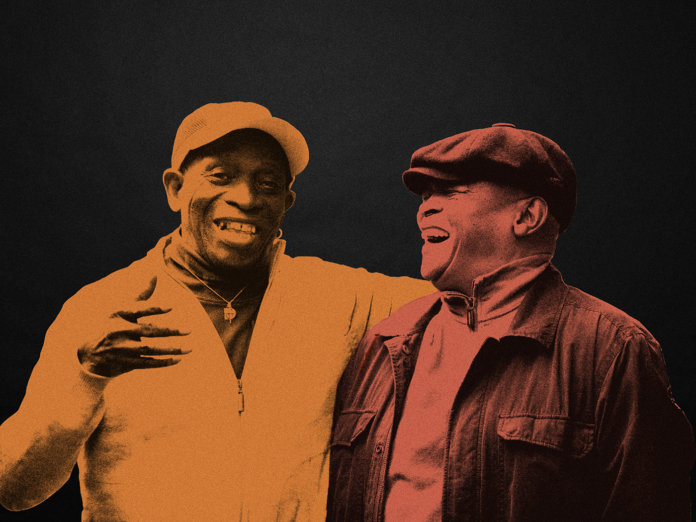When Tony Allen and Hugh Masekela first met in Lagos in 1973, both were still in their early thirties but were already giants in their field. As Fela Kuti’s drummer, band leader and co-conspirator, the Nigerian-born Allen drove the mighty groove we now know as Afrobeat. Masekela, meanwhile, was th...
When Tony Allen and Hugh Masekela first met in Lagos in 1973, both were still in their early thirties but were already giants in their field. As Fela Kuti’s drummer, band leader and co-conspirator, the Nigerian-born Allen drove the mighty groove we now know as Afrobeat. Masekela, meanwhile, was the premier ambassador of black South African music, his trumpet-playing instantly recognisable for its jazzy virtuosity and indestructible township groove. Forced into exile by apartheid, he found pop success in America, playing the burnished trumpet solo on The Byrds’ “So You Want To Be A Rock’N’Roll Star” and enjoying a No 1 of his own with the exuberant instrumental “Grazing In The Grass”.
It was soon after this initial meeting that the pair first discussed making an album together, but little did they know that it would take almost half a century to bring the project to fruition. The result is a triumphant collaboration between two colossi of African music that fully merits its celebratory title: and yet Rejoice is also tinged with a deep poignancy, for Masekela’s death from cancer in 2018 left Allen and producer Nick Gold to add the finishing touches without him. They’ve done Bra Hugh’s memory proud, though, on a joyous set of ambidextrous jazz rhythms, skittering Afrobeat grooves and swinging township jive that brings together the combined experience of more than a century of stellar music-making.
The original sessions took place in London over a weekend in 2010; the previous year, Allen had been recording his solo album, Secret Agent, with Gold and mentioned the idea of making an album with Masekela. Gold agreed to midwife the project and booked the two of them into his studio for a weekend the next year, the only gap in their schedules.
With none of the material pre-written, the recording process was “direct and spontaneous”, Allen commencing each track with a drum pattern and Masekela picking up on the rhythm to add a melody on his horn, plus some jive-laden vocal chants on a handful of tracks. By the end of the two days they had an album’s worth of material vibrant with an intuitive alchemy that made it far more than just a jam.
The plan was to reconvene at a later date to ‘top-out’ the album, but schedules continued to clash and then Masekela fell ill. The tapes were still languishing untouched in the vault when he died, but Allen told Gold it was their duty to finish the album as a tribute to their fallen comrade.
Assisted by young musicians from London’s fertile contemporary jazz scene, the album was finished in 2019, with subtle splashes of sax, keyboard and vibes to add light and shade, but with the dialogue between Allen’s drums and Masekela’s trumpet still at the centre.
Allen’s extraordinary syncopation is the most immediately striking element: there’s no four-to-the-floor backbeat here but a set of complex polyrhythms in which Art Blakey meets African tribal tradition. Masekela blows exuberantly over Allen’s groove and almost imperceptible minimalist nuances of double bass and keyboards on opener “Robbers, Thugs and Muggers (O’Galajani)”, while Steve Williamson’s tenor sax is further to the fore on “Agbada Bougou”, riffing off Masekela’s elegant trumpet lines as Allen’s slow-burning rhythm builds to a crescendo.
“Coconut Jam” sounds as if Allen is playing a different rhythm with each of his four limbs, evoking a hot Lagos night in Fela Kuti’s Shrine club, while “Slow Bones” recalls Afrobeat’s jazz roots in the style of Kuti’s earlier 1960s jazz/highlife band Koola Lobitos, topped by some exquisite jazz phrasing from Masekela. Elsewhere Allen’s groove is at its most skittering on “Obama Shuffle Strut Blues”, a title that reminds us that the world was a rather different place when Masekela gave the tune its optimistic title a decade ago.
Although Rejoice is essentially an instrumental set, Masekela chants fiery tributes to Fela on “Never (Lagos Never Gonna Be The Same)” and to Allen on “Jabulani (Rejoice, Here Comes Tony)”, one of the album’s highlights, not least for a wonderful coda from Lewis Wright’s vibraphone. Finally, Allen contributes his only vocal, a deep and inscrutable semi-spoken message to the next generation on “We’ve Landed”.
Warm, uplifting and fizzing with both passion and virtuosity, Rejoice is not only a fitting last will and testament from Masekela, but a glorious affirmation of music at its most potent and universal.



